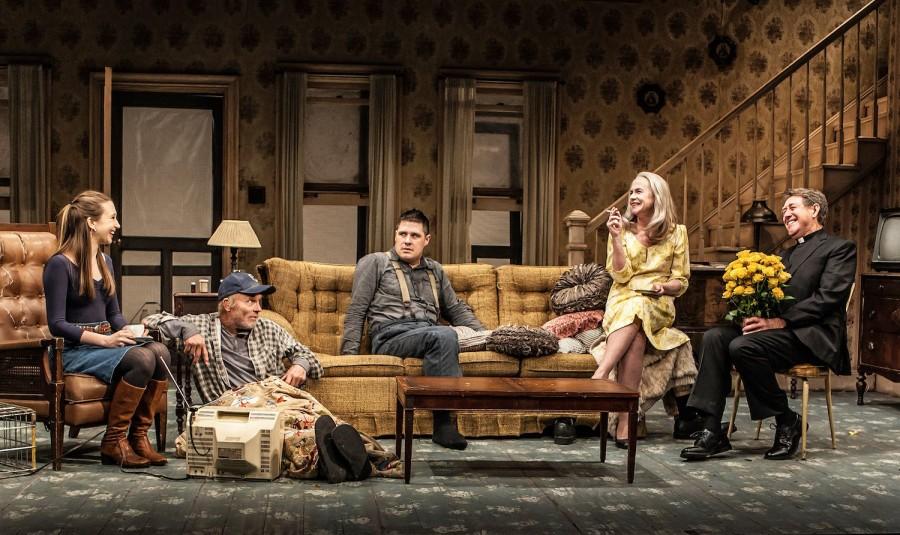1978 Play Disrupts Nuclear Family
Sam Shepard’s Pulitzer Prize-winning play, “Buried Child” returns 20 years after its last New York production.
March 21, 2016
Scott Elliott’s production of Sam Shepard’s 1978 classic “Buried Child” was not only appropriately timed — its focus on the disintegration of nuclear families and disillusionment is aptly matched with our current cultural state — but stunningly well-produced. The Pershing Square Signature Center flawlessly transformed its Griffen Jewel Box Theatre into the interior living room of a 1970’s Illinois farm home, complete with a staircase to the purported second floor and a screened-in front porch, through which a convincing rainfall can be seen for much of the play.
The plot, which revolves around a wizened old man named Dodge (Ed Harris), follows the devolution of his family. In between stolen sips of whiskey and the sort of remarks one expects from a man who’s too frail to walk but too proud to admit it, Dodge’s family is introduced: his wife, Halie (Amy Madigan); his sons, Tilden (Paul Sparks) and Bradley (Rich Sommer); a young man, Vince, who claims to be Tilden’s estranged son (Nat Wolff) and Vince’s girlfriend, Shelly (Taissa Farmiga). Gradually, one gathers that Tilden has inexplicably “lost his marbles,” Bradley mysteriously lost his leg in a chainsaw accident, Dodge is endlessly berated by his wife and catered for by his sons and nobody recognizes Vince, who drove all the way from New York to reconnect with his family.
Shelly is wrapped into the dark and confusing world of her boyfriend’s relatives. Emotional outbursts pepper the dialogue, with powerful tirades from Madigan and a drunken rage from Wolff that was as beautiful as it was terrifying. So many dishes end up broken that one imagines it’s a wonder the crew has managed to keep the set looking as immaculate as it remains. Still, the beauty and power of silence is not overlooked.
Shelly, a fiery pistol of a girl who’s levelheaded and unafraid, seems to be the lone rational person in the house. She guides the family through the questions that trouble the viewers. Her moments of terror and weakness are the audience’s; her bravado is so comforting in such a strange tale that when she breaks, the audience knows things have reached a breaking point. Farmiga’s performance is impeccable, rife with the subtle skill of body language and honesty in acting.
As things reach a climax and the full story is finally brought to light, actors depart until Vince is left sitting over the corpse of his grandfather, and beneath the fear of what has just happened there is an eerie peace to the whole scene. What could easily be a chaotic and grotesque conclusion is instead macabre but seemingly inevitable. No detail is left untended to, and the audience leaves in a wash of awe.
“Buried Child” is playing at 480 West 42nd St. until April 3.
A version of this article appeared in the March 21 print edition. Email Hailey Nuthals at [email protected].

























































































































































